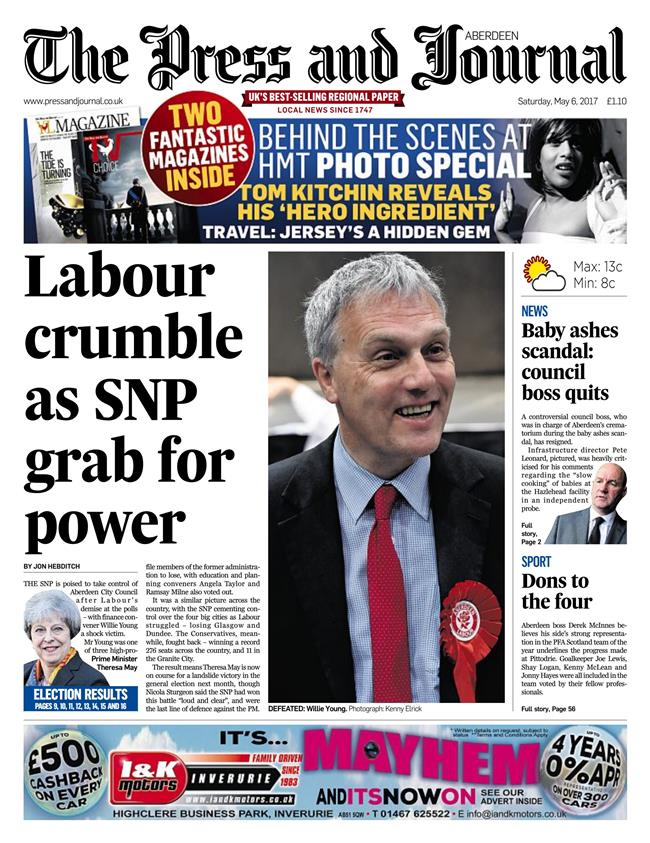If you read Twitter last week, you’d think the biggest contribution the local Press has made to election coverage so far has been the decision to accept ad wraps from the Tories on titles across the country.
 Among the titles accepting the wraps was the Chorley Citizen, the first newspaper I ever did paid work (and a heck of a lot of unpaid work) for. Back in 1996, my first ever front page was printed in spot green (remember that?) because a wrap had been sold. A wise old hand at the time advised me ‘to get use to it.’ It wasn’t a political wrap, but it was an advertiser paying to be the first thing a reader saw.
Among the titles accepting the wraps was the Chorley Citizen, the first newspaper I ever did paid work (and a heck of a lot of unpaid work) for. Back in 1996, my first ever front page was printed in spot green (remember that?) because a wrap had been sold. A wise old hand at the time advised me ‘to get use to it.’ It wasn’t a political wrap, but it was an advertiser paying to be the first thing a reader saw.
In a way, the fact that the Tory wrap is making a noise in 2017 is proof that the ad is doing its job. Does it challenge the independence of newspapers? No. Does it represent newspapers ‘selling their soul’ as one of ex-editor suggested on Twitter? No. Is it a good sign that a political party, after several elections of largely ignoring the regional press, are looking at us as a way to communicate with voters once again? I would argue yes.
The real election story of last week for the regional Press was created in town halls, sport centres and function suites up and down the country. In many cases, we were the only media representatives there to witness seats being won, seats being lost, guards being changed and political careers beginning or ending.
From Manchester, Bristol, Teesside, Liverpool, Cambridgeshire and Birmingham voting in their first directly-elected mayors through to every council in Wales and Scotland and elections at county councils across England, democracy made front page news in many places on Saturday. Here are some of those front pages (If you are of a socialist viewpoint, you may want to look away now!)



























Nice try but a wrap for Bloggs’ Carpets is not the same as one for a political party. In the Eighties, when I trained, the editor measured to the centimetre every election story and ensured each got broadly the same across the campaign. Ridiculous “balance”, of course, but he would never have accepted a political wrap. It would have been beyond the pale. Even political ads wd have been cause for editorial concern. We should accept last week’s party wraps for what they are: an offer cash-strapped owners can’t refuse.
Thanks Tony!
I remember speaking to a local travel agent who used a spot green blob on his sdvin the Hemel Hempstead Gazette way back in 1954 .
The number of holidays he sold off that ad rose tenfold.
I know an editor who made an art out of using Spot Red pages on ‘Poppy Day’ (as it was called in one office I worked in as it fit the bills better) to have black and white pictures but with red poppies!
I think I agree with Tony the wraps are an offer bosses felt they couldn’t refuse. I also disagree with David the wraps are a “a good sign that a political party, after several elections of largely ignoring the regional press, are looking at us as a way to communicate with voters once again”. I think these wraps, which were published at the 2015 election, have now been accepted by groups that may have previously refused them.
When I spotted the wrap around the local “evening” paper I checked for any online feedback and bar one or two comments all was silent. However the following day a photograph had been posted to Twitter, with a negative comment, and the backlash was apparent all day. Sadly it seems the wrap -and of course the newspaper inside – had gone unnoticed the previous day in the shops.
Interestingly amid all the negative comments on my social media feeds from people complaining the paper had sold out and they would never buy it again one acquaintance noted that inside was a “very good article explaining Theresa May’s cynical timing in calling the election”.
Sadly it seems such ads around the paper also hide what’s inside. I also think there is an issue with connection and people feel papers they trusted for their independence have damaged that relationship, even if they understand the seperation between advertising and editorial.
Thanks for this. I think there’s a general issue about readers understanding how advertising funds journalism generally, and the political elements here complicate that. I’m always a little skeptical about storms on Twitter because a) how many of them actually buy the paper regularly and b) how many of them are happy to read content for free online? Time will tell I guess.